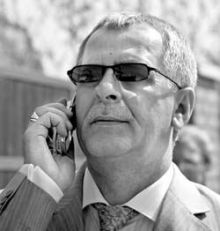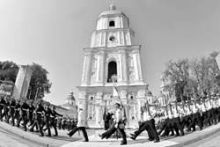Vasyl Vovkun, the chief stage director of festivities commemorating Independence Day in Kyiv, says it is especially important to use creative means to form our country’s national visage and international image.
THE GOLDEN CURTAIN
One could complain about living in an age of changes during that distant time when life moved at the speed of a horse. Today changes are perhaps the quintessence of human life; all its aspects reveal a pressing desire to accelerate these changes. The head-spinning development of communications is leading mankind to the salutary idea about the need to live as one family in our only home, planet Earth. When it becomes clear that oil does not belong to the Arabs, gas to the Russians, or black earth to the Ukrainians — just as it is apparent now that Hiroshima and Chornobyl belong to everyone — there will come an age of reflections over and above the limits of time or national boundaries.
Most people can already see this coming. Here special responsibility rests with artists. Those working in the sphere of mass art must realize that for them, it is like karma because mass events, or visions, as Vovkun calls them, are aimed at making everyone understand the life-giving nature of humanistic work. All those involved in this kind of work are in a wordless and noncontact dialog. What they create is saturated with light, which blinds some and gives others the joy of enhanced vision.
When the Iron Curtain was lifted, the speed and ease of this act surpassed all expectations, and this somehow compensated for the countless victims that fell on the way to it. People had barely started rejoicing when the Golden Curtain dropped, followed by the division of society according to material status, fences, mansions, and expensive foreign cars that substituted for intellect, honor, and conscience, and which is threatening our society with conflicts. Vovkun has been indefatigably seeking to wrap a golden curtain of understanding and mutual respect around spectacles that take place on city squares and arenas, rejecting the fake glamour of declarations about equality and fraternity for those standing on and near the podium, or those watching it on television.
CRACKS IN TIME
The current generation of Ukrainians is the happiest in their national history. We are the masters of Europe’s largest country that won its independence painlessly. Let us rejoice in this! However, the sorrow in all those old songs remains; it is even heard in modern, merry rhythms. The black holes of the bad times sucked in itinerant philosophers, prospects of total literacy, and Ukrainian-speaking literary geniuses, and instead cast forth rural provincialism, crushing everything that could attest to the rugged individualism of our national culture.
Vovkun lives with the understanding that there is no provincialism in culture (Kateryna Bilokur and Franz Kafka, his favorite geniuses, did not make a name for themselves in capital cities). He weaves the material of our people’s spirituality with the aristocratism germane to our nation and which the empires failed to trample. It is the principle of collecting works of Ukrainian primitive art; it is graphically demonstrated by collections of ancient Ukrainian embroidered shirts and blouses. This is also the norm in the Vovkun family. However, it is most vividly present in dramatized shows or, to be more precise, in their ritualization and universal ritualistic character.
The immortal seeds of national culture sprout in Vovkun’s productions and are perceived as something generally known, without anyone having to rack one’s brains to understand what is happening.
The entire country was thrilled to watch the symbolic hearts of Ukraine ignite to the accompaniment of Ruslana’s song “Rhythm of the Heart” (Vovkun’s idea) in Kyiv, Dnipropetrovsk, Lviv, Odesa, Donetsk, and Kharkiv during the 2005 Eurovision song contest.
The active and conscious revival of the Ukrainian spirit is elevated by its simplicity. It has nothing to do with marveling at, and sometimes flaunting, embroidered shirts and antiquities, for this is often nothing more than an attempt to worm one’s way into the Ukrainian milieu for the sole purpose of eventually coming out on top, in command and possession.
Vovkun’s world views are free of party affiliations. He has a simple and clear picture of the world: there is the kind and just Almighty; together with Him, hard-working and honest people are building a happy life. People respect him who is conferred power by the Lord and who is chosen as His representative on earth.
That was why, in Vovkun’s mise-en-scene during the inauguration of President Viktor Yushchenko, he and the family were in a chapel at the base of the Monument to Independence, with his associates standing several steps lower. They were all in the people’s embrace, symbolized by the color orange that seemed to stretch as far as the eye could see.
Vovkun’s stage-directing techniques are interesting in that they help people understand the Ukrainian mentality. The productive aggressiveness of the Russian national character is as conspicuous on stage as the desperate pacificism of the Ukrainians, their desire to settle conflict, make peace, and not stand out. As a stage director, Vovkun raises our ego to the level of Skovoroda’s “The sons of the age are wiser than the sons of the day.” This is why the philosopher emerges in the modern symphony Skovoroda in three symbolic forms: the Gospels, a fish, and a cup. During a moment of spiritual harmony they kiss each other on the shoulders and escape conflict through self-absorption.
THE EYES OF LANGUAGE
There are virtuosos of eloquence in every walk of life. The hyper-discreditation of the word and the devaluation of thinking are gnawing away at humanity the way low-alcohol carbonated drinks destroy the liver.
How can one make a thought visible? What scene can enliven a dialogue of perception? The language of rhythm, the melody of colors, perception of the subconscious — these are galling questions that spring from the mind of this director.
“Man’s perception of reality is not a simple, naive act. Rather, it is a zigzag process including the possibility of separating fancy from real life; a simultaneous transformation of an abstract notion or an idea into an image, a parallel creative vision,” sums up Vovkun.
His two-volume book demonstrates a methodical and organized approach. It is not a biographic account but much more: it is a biochronicle of the growth of mastery. Dramatic art lives by instants and is not subject to fixation. No videotapes can show what actually happens at a given moment in real life and echoes in the hearts of thousands of spectators.
The author of the book records events and concomitant reflections and conclusions in a markedly concise manner. Most importantly, he does so because he believes that this will be of use to his colleagues and fellow thinkers. To this artistic personality a creative dialog is obviously far more important than eternalizing in writing the grandeur of his creative heritage.
THE FIRST JUBILEE
Vasyl Vovkun, my senior Lenin scholarship student (under the Soviets this scholarship was a great privilege and spelled big money: 100 rubles a month) marked his 50th jubilee at the former museum of the “leader of all peoples.”
Although I was older than him but behind him in university, I never thought I would follow in Vasyl’s footsteps. He was a straight-A student, a born leader who broke many girls’ hearts. The wisdom of life, however, sends us signals that we have to decode. For several days Vovkun’s house was located in the Ukrainian Home. Originally, the architect planned the interior of this Soviet museum to embody the idea that human history follows a spiral course. Therefore, its oval stories shrink in diameter from bottom to top. We understood from Vovkun’s speech that the Ukrainian Home consists of each of our homes. Although we are far from the Confucian idea of the family being superior to that of the state, once again we felt united by Shevchenko’s “great new family of the free.” We felt inspired and charged with fresh hopes.
There was a banner above the entrance to the Ukrainian Home with Vovkun’s portrait and information about the exhibit and launch of his book Paralelni vydyva (Parallel Visions). He was smoking a cigarette. Somehow it didn’t become him, but the smoke rising from it promised moments of revelations and insight, as in his production King Oedipus, which was staged first in Chornobyl and later on Independence Square, the Maidan, and finally as a philharmonic performance that took place on the second day of the Independence Day festivities.
One of the halls held a collection of antiquities and a wall-sized portrait of the celebrity with his wife, son, and daughter-in-law. “Try to see a thought,” says the stage director, “this is my greatest value.”
Addressing President Yushchenko and thanking him for the title “People’s Artist of Ukraine,” Vovkun became so overwrought that he asked his mother to come to his assistance. The old woman did not have to search for words. She said, “I’m praying for Ukraine, for the Ukrainian people, I’m praying for you, my children!”
Oleksii Kuzhelny is a stage director and People’s Artist of Ukraine.








